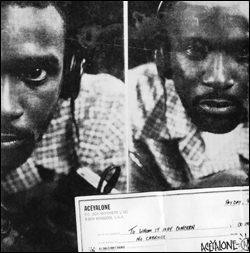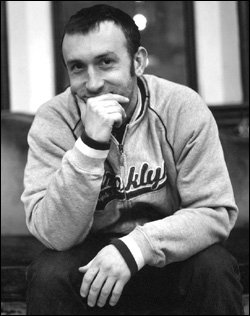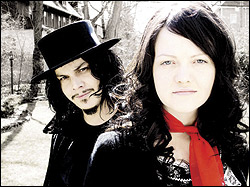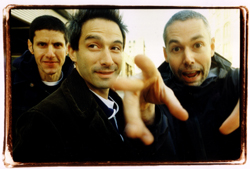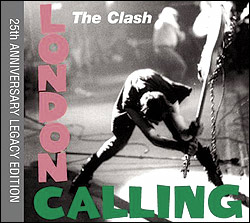The mid-’90s were the beginning of a new golden age for hip-hop—Nas, the Notorious B.I.G., OutKast, and Jeru the Damaja all released shit-hot debuts, Dr. Dre’s Minimoog juggernaut soundtracked a string of summers, and the Wu-Tang empire ruled subterranean New York with an iron fist. But even as a new generation of stars infused hip-hop’s Top 40 with unprecedented populist creativity, the genre’s less commercial practitioners found themselves marginalized to a degree they hadn’t contended with before. By the decade’s halfway point, the Jungle Brothers were in the midst of getting jerked around by Warner Bros., while Elektra was busy sabotaging the careers of everyone from KMD—turfing Black Bastards and its controversial lynched-Sambo cover—to Del the Funky Homosapien, whom they dropped after No Need for Alarm proved insufficiently club-friendly. It wasn’t the best time to make waves on a major, especially when the labels had all the sure things they needed tearing up the charts.
Aceyalone’s situation wasn’t much different. The former member of L.A.’s Freestyle Fellowship—a crew just as famous for being slept on as they were for their tight lyrics—would find himself in an all too familiar major-label dilemma when he released All Balls Don’t Bounce, his first solo disc, in 1995. Long (and familiar) story short: MC records an hour’s worth of mind-bending logorrheic howitzer verbiage over bong-friendly jazz beats; label—in this case, Capitol—is not particularly pleased; sales are poor; album deleted from catalog, left to lapse into esoteric collectors’ footnote.
Aceyalone would continue to record on a variety of indie labels, including his own Project Blowed. But something funny happened on the way to obscurity: All Balls‘ reputation grew, with eBay junkies coughing up dough by the stack just to hear it. Which means now is the perfect time for Project Blowed’s new two–CD reissue/retrospective, All Balls Don’t Bounce: Revisited—and for a reassessment.
Aceyalone’s formula is deceptively simple: keep lines assonant but concise; don’t use an 80-cent word when 16 nickel words will do; drop more exclamation points in your flow than commas. But what keeps All Balls from becoming as drab and dated as many of its proto-backpacker contemporaries (and successors) is the way Aceyalone’s voice flows dynamically across Fat Jack’s dusty-fingered production—pushing against the rhythm’s tide one moment, riding the beats like he’s laminating them the next.
The first few seconds of leadoff track “All Balls” is one of the strangest yet strongest introductions of any rap album of the ’90s: A squirrel clambers across a stand-up bass as a disco air-raid siren fires up, and as the bass line shifts into an elastic Ron Carter rumble, the mocking cadence of the Ace’s voice rattles off a flood-of-consciousness assault of bewildering taunts. Aceyalone’s steady flow is prone to sudden outbursts of stiggedy-wiggedy rattled-off tempo-shifting verbiage, which render his frequent what-the-hell-was-that references even more disorienting. “OK, listen up, gentlemen/Veterans, vitamins, specimen, lettermen/Tell a friend peddlin’ amphetamine medicine meddlin’/ . . . /Reverend see no evil since Solomon origin motherland/Must I begin babbling?” he asks in the opening verses of “The Greatest Show on Earth”—as if he hadn’t begun babbling already.
But even if it gets a bit suffocating, the weirdness sometimes has its way of paying off: “Arhythamaticulas” greets the album’s halfway mark with a scuttling minimalist goth churner that mutates into halcyon crunk; when Ace spits about how he’d “rather be undefined, not underestimated or undermined/I’m underlined as the underdog under the influence of time,” you can almost hear indie rappers like the future members of Living Legends run for their rewind buttons in the background.
The battle-rap eccentric side of Aceyalone isn’t the only facet of the album. “Annalillia” is a frustrated love song that plays like A Tribe Called Quest’s “Bonita Applebum” with a bitter brush-off ending, and the John Carpenter ambience of “B-Boy Kingdom” details a hip-hop-saving sabotage mission that’s a potential progenitor of Mr. Lif’s 2002 single “Return of the B-Boy.” And the reissue’s bonus disc proves illuminating, if a bit embarrassing—while the superdense bass-assault remixes and the monster posse cut B-side “Feet Up on the Table” are welcome bonuses, the cornily overearnest positivity anthem “Show Your Right” and the baboons-and-raccoons-on-shrooms absurdity of “Tweakendz” are patience-testing exhibitions of goofiness that can make the most nerdy of emo-rap heads beg for DMX. But given its post–Low End Theory hard-bop-gone-psych aesthetic and the emphasis on skills and ciphers and blunted mind warping, and despite its unevenness, All Balls Don’t Bounce stands as an important harbinger of underground rap’s first big steps past the constraints of the majors. Aceyalone’s gotten his long-awaited props, and the underground rap community has ensured that he’ll be able to live off of more than his balls and his word.
Aceyalone plays Chop Suey with Visionariesand Mr. Hill at 8 p.m. Mon., March 22. $10 adv.
